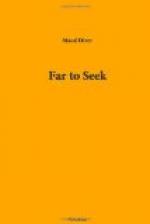Within a year of his ill-considered marriage Sir Nevil had astonished all who knew him with the unique Exhibition of the now famous Ramayana pictures, inspired by his wife: a series of arresting canvases, setting forth the story of India’s great epic, her confession of faith in the two supreme loyalties—of the Queen to her husband, of the King to his people. His daring venture had proved successful beyond hope. Artistic and critical London had hailed him as a newcomer of promise, amounting to genius: and Lilamani Sinclair, daughter of Rajputs, had only escaped becoming the craze of the moment by her precipitate withdrawal to Antibes, where she had come within an ace of losing all, largely through the malign influence of Jane—her evil genius during those wonderful, difficult, early months of marriage.
Nevil had returned to find himself a man of note; a prophet, even in his own county, where feathers had been ruffled a little by his erratic proceedings. Hence a discreetly changed attitude in the neighbourhood, when Lilamani, barely nineteen, had presented her husband with a son.
But—for all the gracious condescension of the elderly, and the frank curiosity of the young—only a discerning few had made any real headway with this attractive, oddly disconcerting child of another continent; this creature of queer reserves and aloofness and passionate pride of race. The friendliest were baffled by her incomprehensible lack of social instinct, the fruit of India’s purdah system. Loyal wives and mothers who ‘adored’ their children—yet spent most of their day in pursuit of other interests—were nonplussed by her complete absorption in the joys and sanctities of home. Yet, in course of time, her patent simplicity and sincerity had disarmed prejudice. The least perceptive could not choose but see that she was genuinely, intrinsically different, not merely in the matter of iridescent silks and saris, but in the very colour of her soul.
Not that they would have expressed it so. To talk about the soul and its colour savoured of being psychic or morbid—which Heaven forbid! The soul of the right-minded Bramleigh matron was a neutral-tinted, decently veiled phantom, officially recognised morning and evening, also on Sundays, but by no means permitted to interfere with the realities of life.
The soul of Lilamani Sinclair—tremulous, passionate and aspiring—was a living flame, that lighted her thoughts, her prayers, her desires; and burned with clearer intensity because her religion had been stripped of all feastings and forms and ceremonies by a marriage that set her for ever outside caste. The inner Reality—free of earth-born mists and clouds—none could take from her.




